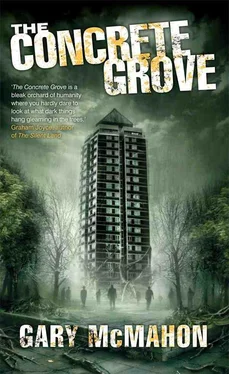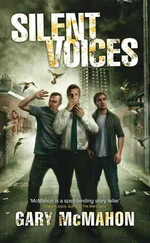Accompanied by the soundtrack of the latest number one record, playing from a tinny little radio on a shelf in a cheap riverside café, the deal was sealed, the pact was made. Such were the circumstances under which two ordinary people became murderers.
TOM’S CAR WAS parked on the Gateshead side of the river. They left the cafe and headed up the hill, away from the water, to the small parking area behind a row of terraced houses that had been converted into shops and offices: a solicitors, a print shop, a DVD rental outlet.
They sat in the car and stared through the windscreen, across the short cobbled lane at the tall wall guarding the yards at the rear of the buildings. The wall was topped with razor wire and there were No Parking notices painted across the garage doors.
“I’ll drop you back at your place,” said Tom.
Lana gripped his hand on the steering wheel. “Thank you.”
He nodded. Started the car.
They drove back across the bridge and along the bypass, heading towards the Cramlington exit. The traffic was heavy but it moved freely.
“How about driving past your street on the way? I want to see where you live.”
Tom glanced at her, and then returned his gaze to the road. “Why? It’s just a normal house on a boring street outside boring old Far Grove.”
“Because it’s a part of your life I know nothing about. I’ve only seen one side of you — the side that comes to visit me and takes us on day trips.”
“And agrees to help you kill people.” He said it without a trace of sarcasm. He wasn’t making a joke.
“Yes. That part, too. The part of you that wants to help me, no matter what the cost.”
They both fell silent for a while, and only when they saw the first road sign for Far Grove did Tom break that silence: “Okay. We’ll swing by my place first, just so you can see how dull and tragic my life really is.” This time he smiled, but it seemed slightly forced, as if he was trying just a little bit too hard to act normal.
Lana watched the streets go by. The houses were mostly suburban new-builds, residential boxes made by development companies to house people who didn’t care about period detail and a sense of history. Red bricks, plastic window frames, double glazing. A small plot of garden, a garage and a concrete drive. It was all so strained that Lana felt as if the image might crack, like something painted onto a sheet of glass.
“This is mine. Ours.” Tom drove slowly along his own street, not even looking at the houses. “Number Sixteen.”
“I didn’t really have you down as a new-build man. I thought you might live somewhere a little more… well, interesting.”
“It was Helen. Her dream. She always wanted to live in a nice middle class area, with a new kitchen and a driveway. Flowers in all the borders and a fucking rotary washing line on the back lawn.” His voice was filled with bitterness. Lana could hear it, like a whining sound behind the words. “Her cosy little fantasy.”
“I’m sorry. I shouldn’t have asked you to bring me here.”
“No.” Tom stopped the car and then turned it around in the road to face the way they’d come, performing a neat three-point turn. “It’s good that you see all the sides of me.” He still hadn’t looked at his house. The curtains were closed. None of the windows were open even a crack. “There are things in that house that I never want to go back to, but I know I will. I can never leave for good.”
She knew that he meant the memories, and the elements of the life he and his wife had stored there behind the closed doors and windows, but somehow she got the feeling that there was another layer to what he was telling her, a subtext that she couldn’t quite grasp. It was puzzling, and slightly disturbing. He seemed to have changed from the last time she’d seen him. Nothing major, just subtle details about his character that she couldn’t even attempt to isolate without feeling that she was simply reading too much into his reactions.
But something about him was different. She could feel rather than see those changes, but nonetheless they were there.
“I’ll take you home,” he said, as the car approached the end of the road. “We can talk more there, away from this mess that I’ve made.”
From one mess to another , thought Lana. But at least this one’s of your own making .
She felt guilty for pulling Tom into her problems, yet at the same time she was grateful that there was at least someone she could turn to for help. Other than Tom, she had no one. Her life had emptied of real friends as soon as Timothy had taken it upon himself to use murder and suicide as a solution to his problems.
But wasn’t that now what she was about to do? Wasn’t it exactly the same as Timothy had done?
No , she thought. It’s different. But in what way it was different she couldn’t tell. Was she more justified in murdering a rapist loan-shark than he had been in killing people-trafficking gangsters? Could you even define crimes in this way, deciding which was worse and calculating what would represent a right and just punishment? Wasn’t it all just vigilante justice, like some absurd Death Wish film? If that were the case, then she suspected she made a shitty Charles Bronson substitute.
“What’s so funny?” Tom’s voice pulled her out of her thoughts.
“I’m sorry. I didn’t realise I was smiling.”
“You laughed. I was wondering what the joke was. I could use a joke right now.”
“I think we both could.” They were entering the Grove now. A group of teenagers dressed in gaudy tracksuits and hooded sweatshirts were standing on the corner of Far Grove Way, staring down the passing traffic. Tom glanced at them. He smiled.
“Jesus, there’s always kids hanging about.” Lana turned away.
“Little shits,” said Tom. Something hit the side of the car — a stone, a bottle — and Tom slammed on the brakes. The kids ran off in the direction of the skateboard park, laughing and pushing each other as they moved as a pack along the middle of the street.
“ Cunts .” The amount of venom in his voice shocked her. This was the first time Lana had heard him use such extreme language.
“Forget it,” she said. “It isn’t even worth getting upset about.”
Tom put the car into gear and it moved forward, but at a slower pace than before. He kept glancing into the rear-view mirror, looking for someone upon which to take out his frustration. This was another change: the anger, the barely repressed aggression. It frightened her more than she could say.
Tom parked the car outside the flats but made no move to get out.
“Are you coming in?” Lana took off her seatbelt and waited for him to respond.
“Sorry,” he said. His voice sounded rough and hoarse. “My head’s all over the place right now. I’m finding it difficult to stay focused. Everything that’s happening… it’s just confusing me.”
“Everything with us?” She placed her hand on his knee and squeezed lightly. Just a small gesture; it was all that she dared.
“No, not just that. Things are spinning out of control. It feels like being at the centre of a whirlwind and watching the edges come apart.” He turned and looked directly at her for the first time since they’d got in the car. “Know what I mean?”
Lana took her hand off his knee. “Yes. Yes, I do. I know exactly what you mean. It’s happening to me, too — there are things I haven’t told you yet but really should. Other stuff that’s happened to me and Hailey.” She took a deep breath. “Come up to the flat and we’ll talk.”
Tom opened the door and got out of the car. He still looked slightly dazed, as if he hadn’t slept for days, but he was a lot calmer than before. He went round to the passenger side and opened the door for her, stepping back onto the kerb. “Madam,” he said, and this time his smile looked natural.
Читать дальше












